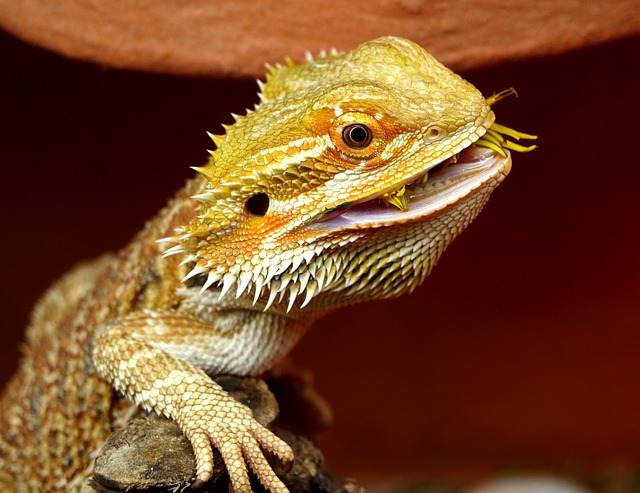Bearded dragons are a popular pet reptile among many animal lovers. These creatures are known for their docile nature and unique appearance.
As with any pet, it’s essential to understand their dietary needs and what foods are safe for them to eat.
One question often arises is whether or not bearded dragons can eat hamsters.
Hamsters are small rodents that are commonly kept as pets. While they may seem like a convenient source of protein for bearded dragons, it’s important to note that hamsters are not a suitable food source for these reptiles.
In fact, feeding a bearded dragon a hamster could have severe consequences for their health. In this article, we’ll explore why hamsters are not safe for bearded dragons and what you should feed your pet instead.
Can Bearded Dragons Eat Hamsters?
What Do Bearded Dragons Eat?
Bearded dragons are omnivorous reptiles that eat various foods, including insects, vegetables, and fruits. Their special diet requires a balance of nutrients to keep them healthy. Insects such as crickets, mealworms, and roaches are staples of their diet.
Vegetables and fruits such as kale, collard greens, carrots, and berries can provide additional nutrients.
Can Hamsters Be Part of a Bearded Dragon’s Diet?
No, hamsters should not be part of a bearded dragon’s diet.
Bearded dragons are not known to eat hamsters in the wild, and feeding them to your pet could be dangerous. In addition, hamsters are high in fat and low in calcium, which can cause health problems for bearded dragons.
Additionally, hamsters are not a natural part of a bearded dragon’s diet and could cause digestive issues.
It is essential to provide your bearded dragon with a balanced diet that meets its nutritional needs. Feeding your pet inappropriate foods can lead to health problems and even death.
If you are unsure how to feed your bearded dragon, consult a veterinarian or a reptile specialist.
The Risks of Feeding Hamsters to Bearded Dragons
Feeding a bearded dragon a varied diet is essential to ensure they receive all the necessary nutrients. First, however, knowing which foods are safe for them to eat is critical. One food that has been debated among bearded dragon owners is hamsters.
While some believe hamsters are a good source of protein for bearded dragons, there are several risks associated with feeding them to your pet.
Potential Health Risks
Feeding hamsters to bearded dragons can pose several health risks. Hamsters are known to carry a variety of diseases, including salmonella, which can be transmitted to bearded dragons.
This can lead to serious health issues and even death.
Hamsters also have sharp teeth and claws that can cause physical harm to bearded dragons.
If a bearded dragon cannot devour a hamster, the hamster may fight back and cause injury to the dragon’s mouth or digestive tract.
Nutritional Imbalance
While hamsters are a good source of protein, they do not provide all the necessary nutrients that bearded dragons need. Bearded dragons require a balanced diet that includes a variety of fruits, vegetables, and insects.
Feeding hamsters to bearded dragons as a primary source of protein can lead to a nutritional imbalance, which can cause health problems over time.
It is important to note that bearded dragons are not natural predators of hamsters. Instead, bearded dragons primarily eat insects, vegetation, and small rodents in the wild. However, these rodents are typically larger than hamsters and provide a more balanced diet.
In conclusion, feeding hamsters to bearded dragons is not recommended due to the potential health risks and nutritional imbalance.
It is essential to provide a varied diet that includes a variety of fruits, vegetables, and insects to ensure that your bearded dragon stays healthy and happy.
Alternatives to Feeding Hamsters
When it comes to feeding bearded dragons, hamsters are not a recommended option. However, several alternatives can give your pet a healthy and nutritious diet.
Safe Foods for Bearded Dragons
Bearded dragons are omnivores and must have a mix of vegetables, fruits, and insects to maintain a balanced diet. Some safe options for bearded dragons include:
- Vegetables: kale, collard greens, mustard greens, turnip greens, dandelion greens, squash, carrots, sweet potatoes, bell peppers, and green beans
- Fruits: apples, strawberries, blueberries, raspberries, mango, and papaya
- Insects: crickets, mealworms, waxworms, and dubia roaches
It is important to note that bearded dragons require a varied diet and should not be fed the same food daily.
Supplements
Supplements can be added to a bearded dragon’s diet to ensure they get all the necessary vitamins and minerals. For example, calcium and vitamin D3 are essential for proper bone development and can be added to their food or dusted on insects.
Commercial Diets
Commercial diets, such as pellets or canned food, are also available for bearded dragons. However, these diets should not be the sole source of nutrition and should be supplemented with fresh fruits and vegetables.
In conclusion, while hamsters should not be fed to bearded dragons, several safe and nutritious alternatives are available. Providing a varied diet of vegetables, fruits, and insects, supplements, and commercial diets can help ensure your pet is healthy and happy.




